Projects Funded by Eastern Arc
Throughout 2019-20 the Eastern Arc Fund provided funding for a diverse range of workshops and projects that supported collaborations between the partner universities and beyond.
It has supported 11 projects led by more than 30 academics and researchers at the three universities, and involved the participation of many more.
There is more detail about each of the projects and workshops below. To find out more about them, contact us here.
-
Dr Megan Klabunde (Essex), Dr Louis Renoult (UEA) and Dr Briana Beck (Kent)
 All three Eastern Arc universities have recruited researchers working on bodily and cognitive aspects of self-knowledge in recent years.
All three Eastern Arc universities have recruited researchers working on bodily and cognitive aspects of self-knowledge in recent years.Following a successful workshop in 2019, this will be an opportunity for them to come together to discuss their work, develop grant proposals, and link previously dissociated research areas into new models and theories.
As well as discussions, there will be practical demonstrations and recordings of experiments being done so that new experimental methods can be learned by the group. It will also look at the practical aspects of facilitating cross-university collaborations, such as sharing measures, data and the development of cross university ethics proposals.
Photo by Kyle Glenn on Unsplash
-
Prof Jim Groombridge (Kent) and Prof Cock van Oosterhout (UEA), with Dr Matt Clark (Natural History Museum)
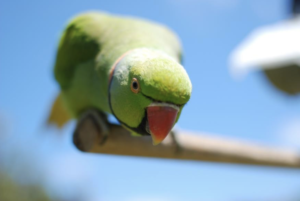 An infectious disease outbreak in 2005 threatened the endangered Mauritius parakeet with extinction.
An infectious disease outbreak in 2005 threatened the endangered Mauritius parakeet with extinction.Working together, teams from the universities of Kent and East Anglia are now collaborating with the Natural History Museum to undertake analyses that will help with the future conservation of the species.
The Kent team has expertise in conservation genetics and ecology; UEA has world-leading conservation genomics. Together, they will sequence – for the first time – the genome of this endangered parrot.
This will identify immunity genes and the results from this will form the basis for a larger, longer project that will help to meet the UN Sustainable Development Goal 15 (‘Life on Land’), and in particular its target to ‘take urgent and significant action to reduce the degradation of natural habitats, halt the loss of biodiversity and, by 2020, protect and prevent the extinction of threatened species’.
Photo by Dr Simon Tollington
-
Prof Simon Carding (UEA), Prof Martin Warren (UEA and Kent) and Prof Mark Smales (Kent), with Prof James Stewart (Liverpool)
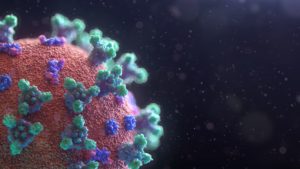 A team comprising researchers from the University of Kent and the Quadram Insitute (QIB) at the University of East Anglia are working to help generate a vaccine against coronavirus and providing support to a key company developing urgently required antigen and antibody tests.
A team comprising researchers from the University of Kent and the Quadram Insitute (QIB) at the University of East Anglia are working to help generate a vaccine against coronavirus and providing support to a key company developing urgently required antigen and antibody tests.The project is using new approaches for vaccine delivery developed by QIB based on engineering the natural ability of resident gut bacteria to generate nanoparticle sized Outer Membrane Vesicles (OMVs).
In combination with the latest developments in recombinant protein production established at Kent, synthetic biology and bioinformatics, researchers have identified key antigen targets within the virus, developed and assembled constructs and will employ plug and play technology to help generate immune-responsive particles.
Photo by Fusion Medical Animation on Unsplash
-
Dr Silvia Gaia (Essex), Prof Claudia Girardone (Essex) and Dr Francesca Cuomo (UEA)
 The EU Directive on Sustainability Reporting has been in place since December 2016. The Directive introduces measures that aim to strengthen the transparency and accountability of approximately 6,000 EU financial and non-financial firms. This pilot project brings together colleagues from Essex and UEA to look at the effects of the Directive.
The EU Directive on Sustainability Reporting has been in place since December 2016. The Directive introduces measures that aim to strengthen the transparency and accountability of approximately 6,000 EU financial and non-financial firms. This pilot project brings together colleagues from Essex and UEA to look at the effects of the Directive.It will look at what measures should be used to assess the success of the Directive, and will examine how corporate governance mechanisms (such as the diversity of a board) affects its implementation.
Photo by Chris Barbalis on Unsplash
-
Dr Fernanda Leite Lopez de Leon (Kent), Stefania Sitzia (UEA) and Patrick Nolen (Essex)
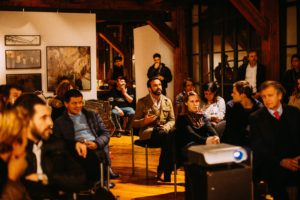 One of the key opportunities presented by Eastern Arc is for staff across the three universities to link together to develop a critical mass where one does not currently exist at any one of the institutions.
One of the key opportunities presented by Eastern Arc is for staff across the three universities to link together to develop a critical mass where one does not currently exist at any one of the institutions.This workshop is intended to do just that. Experimental social science takes the theories underlying individual disciplines, such as economics and psychology, and applies them in the lab or in the field. While there are a number of people at each university who undertake such research, their numbers are relatively small at each compared to that of colleagues in the wider social sciences.
This event will bring them together to share their research, to learn from each other, and to develop an ongoing virtual network in which they can continue to support each other, discuss their work and collaborate in future research opportunities.
Photo by Antenna on Unsplash
-
Erin Sanders-McDonagh (Kent), Roisin Ryan-Flood (Essex), Isabel Crowhurst (Essex) and Alison Winch (UEA)
 Working with vulnerable groups to identify the issues they face presents a number of methodological challenges.
Working with vulnerable groups to identify the issues they face presents a number of methodological challenges.Accessing hard-to-reach populations often requires the involvement of organizations that already have close links with these groups.
This project will work with Centre Point, one of the largest youth homelessness projects in London, to explore how best to design research that effectively engage young people on potentially sensitive issues.
It will undertake a number of exploratory focus groups with young people, introducing different creative methods (e.g. visual methods, body mapping, urban sketching, music biographies, sensory methods and mobile methods). It will work with a number of young people from across London, including care-leavers, LGBT youth, and unaccompanied minors, and the young homeless women, and the wider youth homeless population.
Photo by Eric Ward on Unsplash
-
Dr Stephen Turner (Essex), Mr Birsha Ohdedar (Essex) and Dr Giridharan Renganathan (Kent)
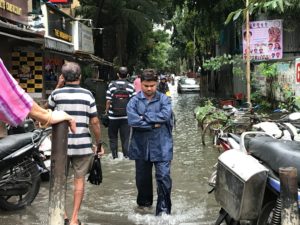 How are human rights affected by climate change? This interdisciplinary workshop brings together experts from law, policy, science, public health, urban planning and architecture to examine this relationship, and how we can use our understanding to guide future decisions.
How are human rights affected by climate change? This interdisciplinary workshop brings together experts from law, policy, science, public health, urban planning and architecture to examine this relationship, and how we can use our understanding to guide future decisions.It will have a particular focus on the way that rights can be used in a practical way to address issues around national policy and planning, public health, low-carbon urban environments and the integration of equity into climate change mitigation and adaptation.
The workshop will lead to the establishment of an interdisciplinary network across Eastern Arc, and will feed into existing efforts and initiatives that are currently taking place at the UN level to clarify the human rights obligations of states relating to climate change mitigation and adaptation.
Photo by Piyush Priyank on Unsplash
-
Prof Andy King (Kent), Dan Knox (Kent) and Dr Lynn Dicks (UEA), with Sam Day (Asian Hornet Action Team)
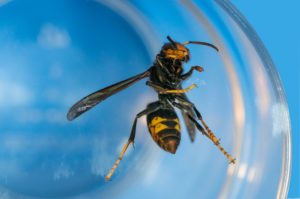 Vespa Velutina, or the Asian Hornet, is an invasive species that can kill humans and threaten native pollinators, which will affect the amount of food we can produce.
Vespa Velutina, or the Asian Hornet, is an invasive species that can kill humans and threaten native pollinators, which will affect the amount of food we can produce.Researchers from the universities of Kent and East Anglia will work with the Asian Hornet Action Team (AHAT) to tackle this threat by using artificial intelligence (AI) to track the hornets and destroy their nests.
This work is necessary and urgent: since being introduced accidentally to France in 2004, the hornets have now become established across Europe, and the first sightings in Kent have recently been reported.
The current method for controlling Asian Hornets is the ‘Jersey method’, which is time-consuming and requires significant input from volunteers, necessitating 6000 hours of time in 2019 for Jersey alone.
If successful, the project will be a significant step towards protecting all pollinators (the
solitary bees, bumbles and wasps), whose decline will have profound implications for ecological diversity and food security.Photo by Larneg on Pixbay
-
Dr Marina Iliopoulou (Kent), Dr Murat Akman (Essex) and Prof Mirna Dzamonja (UEA)
 The mathematics departments of the universities of Kent, Essex and East Anglia have grown considerably in recent years, hosting numerous young mathematicians at the cutting edge of intradisciplinary research.
The mathematics departments of the universities of Kent, Essex and East Anglia have grown considerably in recent years, hosting numerous young mathematicians at the cutting edge of intradisciplinary research.Through this timely workshop, the existing connections between the mathematicians in the three institutions will continue to be built into a network that spreads into all areas of mathematics.
The workshop will focus on the themes of analysis, logic and algebra & topology, with speakers from all three universities.
Photo by John Moeses Bauan on Unsplash
-
Dr Danielle Tucker (Essex) and Dr Alison Dean (Kent), with Dr Pamela Yeow (Birkbeck)
 In order to reduce our reliance on single-use plastic, we need to understand the way decisions are made at a household level, and consider what interventions would be effective in changing this.
In order to reduce our reliance on single-use plastic, we need to understand the way decisions are made at a household level, and consider what interventions would be effective in changing this.This project brings together researchers from the universities of Essex and Kent, together with a collaborator at Birkbeck, University of London, to do just that.
Building on their previous work on the behaviour patterns of consumption in households, the team will examine what part gender plays in this.
Women are often responsible for making decisions about household goods and groceries, but there has been limited research on how ethical decisions are gendered. This project will provide a much deeper understanding of this for policy-makers, retailers and producers.
Photo by Bernard Hermant on Unsplash
-
Prof Irma Clots-Figueras (Kent) and Prof Sonia Bhalotra (Essex), with Dr Joseph Flavian Gomes (UC Louvain)
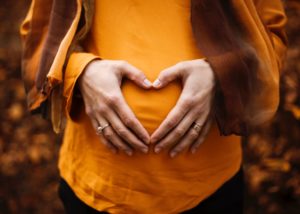 Good weather has an effect on our moods, and previous research suggests that more optimistic financial decisions are made on the stock market on sunny days.
Good weather has an effect on our moods, and previous research suggests that more optimistic financial decisions are made on the stock market on sunny days.However, there is limited evidence of whether variation in early life exposure to sunshine heat or pollution has persistent effects on physical and mental health.
A collaboration between Essex and Kent, together with UC Louvain, will explore this, examining the foetal origins of wellbeing. It will provide one of the first estimates of impacts of climate variation in utero and in the early postnatal period on subjective wellbeing.
Photo by Alicia Petresc on Unsplash
